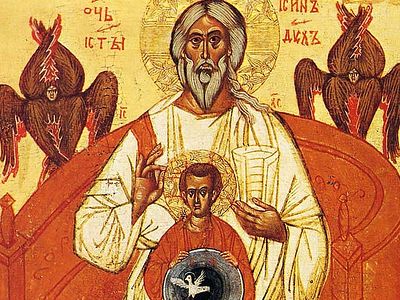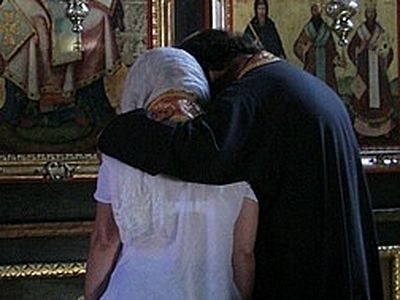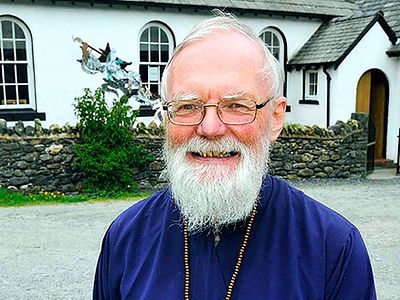For much of popular Christianity today, faith is an entirely personal matter.
We are all individuals on our own personal journey to heaven, and the trappings of a “corporate” experience are altogether optional. The Church is not a kingdom of Saints, but rather one of many ways to get to God.
But throughout Orthodox prayer books and services, God is referred to as “the God of our Fathers.” This phrase, lifted directly from the Old Testament, reminds us that God is truly with us throughout the ages—revealing himself to his people, never leaving us alone nor leading us astray.
We are not servants of an absentee Father or archaeologists on a mission to discover some forgotten deity obscured through the lens of history. Instead, we are inheritors of an eternal kingdom, one that is meant to be joined and experienced as a people of God—not as mere individuals.
And this is why holy tradition is an indispensable aspect of the authentic Christian life.
He Has Revealed Himself to Us
Jesus Christ is God Immanuel—God “with us.” We repeatedly sing of a God that “has revealed himself to us” as Lord and King. He has not left us to ourselves. And this is nowhere more true and apparent than in the life of the Church.
The Church is the place where Christians most truly and intimately encounter God-with-us. In and through the Eucharist, the great thanksgiving, we not only attain nourishment through the death and resurrection of Jesus Christ, but also through each other (1 Cor. 10:17–18):
Since there is one loaf of bread, we, who are many, are one body, because we all partake of the one loaf of bread. Consider Israel according to the flesh: is it not true that those who eat the sacrifices participate in the altar?
What Paul teaches the Corinthians is that through their holy fellowship in the body and blood of Jesus Christ, they are truly made to be one Body of Christ. Just as the people of Israel shared in the sacrifice of the altar in Jerusalem, so too do Orthodox Christians share in the ultimate sacrifice of our God and Savior in the Divine Liturgy.
And in our holy liturgy, we are caught up into heaven to worship alongside God’s holy people from ages past. We are joining in with a worship that is eternally taking place in the throne room of God’s glory. And such is the humility of Chrysostom’s anaphora that exclaims:
We also thank You for this liturgy which You are pleased to accept from our hands, even though You are surrounded by thousands of Archangels and tens of thousands of Angels, by the Cherubim and Seraphim, six-winged, many-eyed, soaring with their wings …
So no, this is not a worship of individuals. This is not a kingdom of those on their own personal journey of discovery.
We are participating in the worship of the God of our fathers, the God of Patriarchs and Saints, and the God of heavenly hosts and awe-inspiring powers.
Praising the God of Our Fathers
In July, we commemorate the Fathers of the Fourth Ecumenical Council (assembled at Chalcedon in A.D. 451). Many of the odes during Vespers for that day repeatedly praise “the God of our Fathers” in the triumph of orthodoxy over heresy:
Confessing Christ to be in two natures and energies without confusion and without change, we reject the error of Severus. Therefore, we cry to him who underwent suffering by the assumption of the flesh: Blessed is the God of our Fathers.
We know that he on the Cross and he in the bosom of the Father is one, as God in the highest and in the grave as united to flesh. To whom with one accord we sing as we cry: Blessed is the God of our Fathers.
Believers, hating the emptying and division of Arius, the diminisher of God, and again the fellow heresy of Sabellius, those enemies of the Trinity, we cry: Blessed is the God of our Fathers.
Additionally, the Old Testament readings for that day (Deut. 1:8–11) remind us:
Behold, I have set the land before you; go in and take possession of the land which the Lord swore to your fathers, to Abraham, to Isaac, and to Jacob, to give to them and to their descendants after them … the Lord your God has multiplied you, and behold, you are this day as the stars of heaven for multitude. May the Lord, the God of your fathers, make you a thousand times as many as you are, and bless you, as he has promised you.
Before Us to Their Rest
The inheritance of Orthodoxy is the inheritance of a trail blazed before us—of our Fathers with us in the here-and-now as they are altogether present through the ministry of Christ and his servants. Through their faithfulness, the Church and our faith are kept pure. We are truly surrounded by a thriving cloud of witnesses, never to be left alone.
And so in each Divine Liturgy, we remember those that have gone before us to their rest:
We offer this spiritual worship for those who repose in the faith: forefathers, fathers, patriarchs, prophets, apostles, preachers, evangelists, martyrs, confessors, ascetics, and for every righteous spirit made perfect in faith.
This perfecting faith in Christ is not about individuals and individual accomplishment, but is rather a stream of faithfulness that flows through each generation. We cannot live an adequate life of faith without the holy Christian tradition—without the faithfulness of Christ that lives and breathes through each one of us as the Body of Christ.
We are a people that worships “the God of our fathers,” not the God of whatever we make him out to be. The former is apostolic Christianity, while the latter is idolatry.




